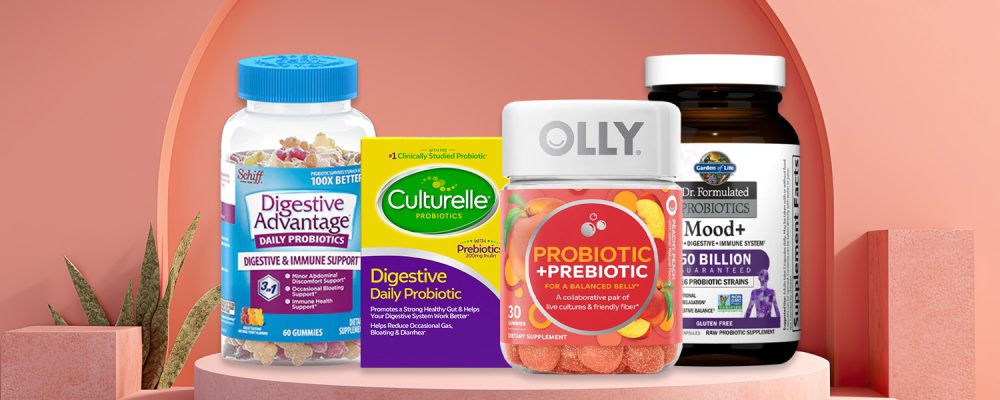Promotes gut health and immune support.
With the significant buzz surrounding the probiotic industry, probably, many individuals have recently integrated these supplements into their health regimens. Moreover, probiotic supplements have seen a remarkable increase in popularity because of their proven effectiveness in improving overall health and well-being. Additionally, there is a rising consumer inclination towards embracing natural methods to improve their overall health.
How can consumers choose the best probiotic supplements when there are so many options available? Our review of the best probiotic supplements of 2024 aims to explore the benefits of probiotic supplements and provide guidance on how to choose the most suitable ones, as well as address some frequently asked questions by consumers.
Best Probiotic Supplements: Our Top Picks
Exploring what made each probiotic brand stand out above the rest provides valuable insights into the leading options in today’s natural supplement market. The following brands each with their unique market presence have earned a place in our top seven list, Specifically:
#1. OLLY Probiotic + Prebiotic Gummy
#2. Digestive Advantage Probiotic Gummies
#3. Garden of Life Dr. Formulated Probiotics Mood+ Acidophilus Probiotic Supplement
#4. Culturelle Daily Probiotic Capsules For Men & Women
#5. Nature’s Way Probiotic Pearls Complete, Digestive Balance and Colon Health Support
#6. NOW Supplements, Probiotic
#7. Bio-Kult Everyday Probiotics
Understanding Probiotics and Gut Health
For the Digestive system to remain healthy, it’s crucial to fully understand probiotics and gut health. A healthy gut microbiota can be supported by probiotics [1], which are good microorganisms present in a variety of foods like yogurt, kefir, and fermented vegetables. And to help even more with gut health and digestive issues, a lot of people add probiotic supplements to their diets.
The vibrant bacterial strains in these supplements have the potential to support the gut’s natural flora, improving immune response, digestion, and general health. People can take steps to improve their gut health, enhancing nutrition absorption, and relieving digestive difficulties by mixing probiotic rich foods with these supplements.
Key Benefits of Probiotic Supplements for Gut Health
Probiotic supplements offer a range of benefits for gut health. Some of these include nurturing a balanced gut microbiome, improving digestion by aiding in food breakdown and reducing discomfort, providing relief from common digestive issues like diarrhea and constipation, potentially enhancing immune function through microbiome balance, and decreasing and avoiding antibiotic-related side effects by restoring gut flora, and contributing to potential improvements in mental well-being and skin health by balancing the gut-brain connection and reducing inflammation.
Some of the more specific benefits of probiotic supplements are as follows:
- Possibly Responsible for Balanced Gut Microbiome: Assisting in the protection of a healthy Digestive system, probiotic supplements enhance the harmonic balance of beneficial bacteria in the gut.
- May Promote Better Digestion: By helping food break down more quickly, they may lessen digestive pain including gas, indigestion, and bloating.
- Possibly Reducing Digestion Problems: Probiotics can encourage regular bowel movements and gut comfort by reducing the symptoms of common digestive issues like constipation and diarrhea.
- May Manage Inflammatory Bowel Diseases (IBD): Probiotics can help manage inflammatory bowel diseases (IBD) by reducing inflammation and immunological responses in the gut lining. However, they are not a cure for the condition.
- Possibly Helpful for Increased Immune Function: Probiotics have a beneficial effect on the gut microbiota, which may strengthen the immune system and make the body more resilient to illnesses.
- May Provide Support Throughout Antibiotic Use: By helping to rebalance disturbed gut flora, probiotic supplements might help mitigate the negative effects of antibiotics, such as antibiotic-associated diarrhea.
How We Evaluated Each Probiotic Supplement
Consequently, to make sure we gave our readers the best and most efficient options, we used a structured and stringent evaluation process when analyzing every probiotic supplement included in this study. Several essential steps were conducted in our method that include:
Research and Analysis
We started our assessment with a thorough market analysis that included a close look at different probiotic brands and their product lineups. Part of our evaluation process involved identifying the leading contenders in the probiotic supplement market.
Selection Criteria
We created a thorough set of selection criteria in order to assess the overall excellence of each probiotic. Essential elements including flavor, ingredient quality, nutritional value, and consumer preferences were included in these criteria.
Survey and Authenticity
We went to considerable lengths to obtain probiotic supplements straight from reliable brands or licensed suppliers. The supplements we assessed were guaranteed to be authentic and upheld the highest standards of quality thanks to our strict criteria.
Nutrition Analysis
The nutritional value of each probiotic supplement was thoroughly assessed as part of our evaluation process (see **Nutrition Analysis**). This research provided important insights into potential health benefits by looking at the quantities of essential bioactive ingredients.
Taste Testing
Reliability and compliance are heavily influenced by taste. To assess the taste and general palatability of the supplements, we collected opinions from a wide range of experts.
Assessment of Ingredient Quality
We carried out a thorough examination of the quality of each probiotic supplement’s ingredients. Probiotic strain origins, adherence to purity standards, and the lack of toxins or hazardous compounds were only a few of the variables taken into account in this evaluation.
Purchase Experiences and Comments
A significant part of our evaluation procedure involved consumer experiences and comments. Customers’ actual experiences with these supplements were taken into account, and offered insightful information on product efficacy and any possible drawbacks.
Comparative Analysis
Our staff carefully considered the distinctions between every probiotic product and assessed how effectively they accomplished the intended health goals. Because of this, we are able to emphasize the unique features of every supplement profiled within this review.
Ongoing Market Surveillance
As part of our dedication to offering our readers a thorough product review, we kept a close eye on the probiotic supplement market. As the probiotic market changed, we kept an eye out for new and improved products to make sure our suggestions stayed up to date and applicable.
Top 7 Probiotic Supplements for Gut Health in 2024
Extensive research and deliberation went into putting together our guide to the best probiotic supplements for gut health. These brands are known for producing potent and pure products that align closely with our stringent criteria.
#1. Probiotic + Prebiotic Gummy
by OLLY
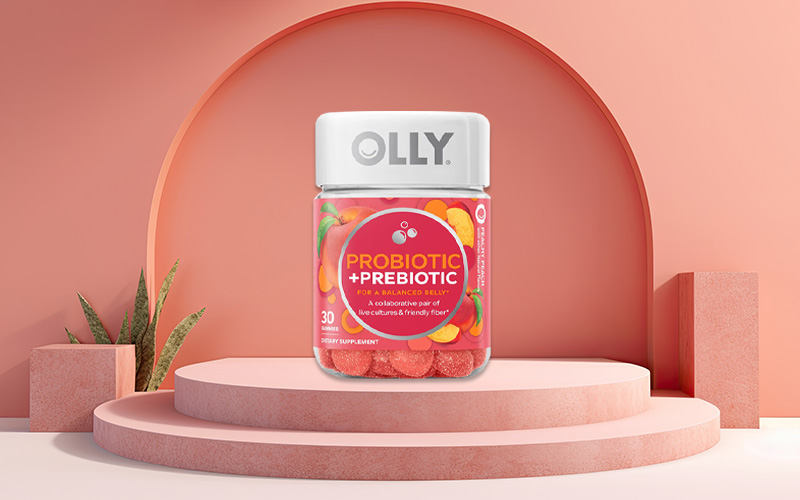

REVIEWOLOGY SCORE
Highlights
PROS
Aids in maintaining a healthy digestive tract.
Tasty, making them easy to incorporate into daily routines.
Gluten-free and suitable for various dietary needs.
CONS
Includes added sugars, which might be unsuitable for certain diets.
Limited bacterial strain variety compared to other probiotics.
Key Features
The OLLY Probiotic + Prebiotic Gummy is designed to support digestive health and balance. It features a blend of probiotics and prebiotic fiber.
The probiotics include bacillus coagulans, which aid in maintaining a healthy gut flora [2], while the probiotic fiber nourishes beneficial gut bacteria. These gummies are intended to promote overall digestive wellness and are particularly suitable for those looking to enhance their gut health in a convenient and tasty form.
Nutrition Breakdown
The gummies balance essential probiotic and prebiotic components with added sugars (<1g) for taste, offering a pleasant flavor without compromising digestive benefits. They also provide 2g of carbs and 10 calories in total. In addition, there is 1g of dietary fiber per gummy.
Key Ingredients
The primary ingredient to these gummies is bacillus coagulans, a probiotic that aids in maintaining gut flora. Prebiotic fiber complements the probiotics, fostering a healthy digestive environment. The gummies’ appealing taste comes from natural peach flavoring. They also include ingredients like water, cane sugar, gelatin, and lactic, citric, and tartaric acid, as well as other ingredients.
What We Like
- Supports digestive and immune health effectively.
- Easy and enjoyable to consume with natural fruit flavor.
- Suitable for adults looking for a simple probiotic solution.
What We Dislike
- Sugar content may not align with all dietary preferences.
- Might not offer as diverse probiotic strains as other supplements.
Summary
At first sight, we liked how appealing the product packaging was. In fact, the gummies actually felt quite yummy. So, we decided to give them a try without a second thought, and were quite happy to do so.
OLLY Probiotic + Prebiotic Gummies provide a tasty, convenient way to support digestive health. Their formula is effective for daily use, though the sugar content, gelatin, and probiotic variety may require consideration for some individuals’ unique dietary needs and preferences.
#2. Digestive Advantage Probiotic Gummies
by Schiff
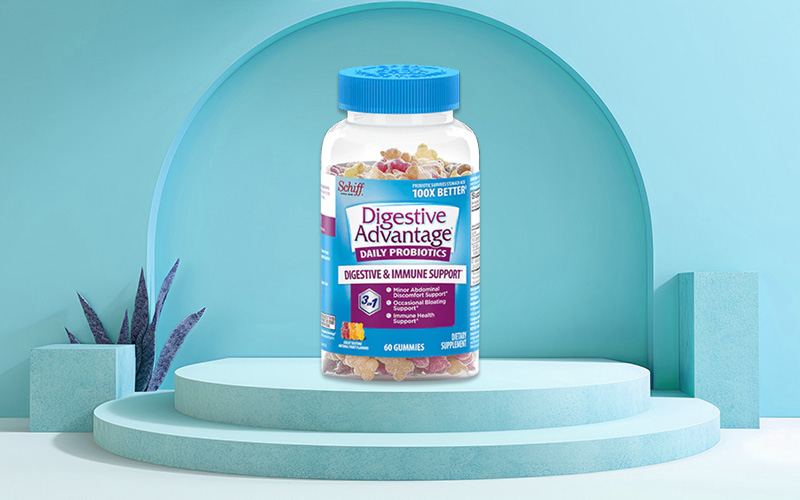

REVIEWOLOGY SCORE
Highlights
PROS
Tasty and easy to consume with natural fruit flavors.
Free from artificial flavors, appealing to health-conscious consumers.
CONS
Contains added sugars and corn syrup, which might not suit all dietary preferences.
May not be suitable for people with specific dietary restrictions or allergies.
Key Features
Digestive Advantage Probiotic Gummies are formulated to enhance digestive health and support the immune system. They contain BC30, a unique probiotic strain that is more resistant to stomach acid than other probiotics, ensuring better delivery to the intestines.
These gummies aim to alleviate minor abdominal discomfort, bloating, and occasional diarrhea. Additionally, they are designed to be tasty and easy to consume, making them a convenient option for daily gut health support.
Nutrition Breakdown
The gummies contain essential probiotic elements with additional ingredients like corn syrup and sugar for flavor, which allows for a pleasant taste without compromising on health benefits. Among the essential nutrients, they contain 5g of carbs and 3g of sugar. In total, the gummies contain 20 calories per serving.
Key Ingredients
The key ingredient in Digestive Advantage Daily Probiotic Gummies is BC30 (bacillus coagulans GBI-30, 6086), a unique and highly resilient probiotic strain. Unlike many other probiotics, BC30 is known for its ability to survive through the stomach’s acidic environment, ensuring that a higher amount of beneficial bacterial strains reach the intestines where they’re most effective. This characteristic enhances the product’s ability to promote gut health and support the immune system.
Additionally, the gummies are flavored with natural fruit flavors to make them palatable, and include ingredients like corn syrup and sugar for sweetness. This combination of a robust probiotic strain with enjoyable flavors makes these gummies an appealing choice for digestive health support.
What We Like
- Effective probiotic support for digestive health.
- Delicious natural fruit flavors that make the gummies enjoyable to consume.
- Suitable for a wide range of ages.
What We Dislike
- Contains sugar and corn syrup, which might be a concern for some users.
- Specific dietary restrictions may limit its suitability.
Summary
Digestive Advantage Daily Probiotic Gummies offer an enjoyable and efficient way to support digestive health. Their unique formulation ensures that the probiotics survive stomach acid, making them more effective. While they’re an excellent choice for people who are looking to improve their gut health, those with certain dietary restrictions or sugar concerns may need to consider other options.
#3. Dr. Formulated Probiotics Mood+
by Garden of Life
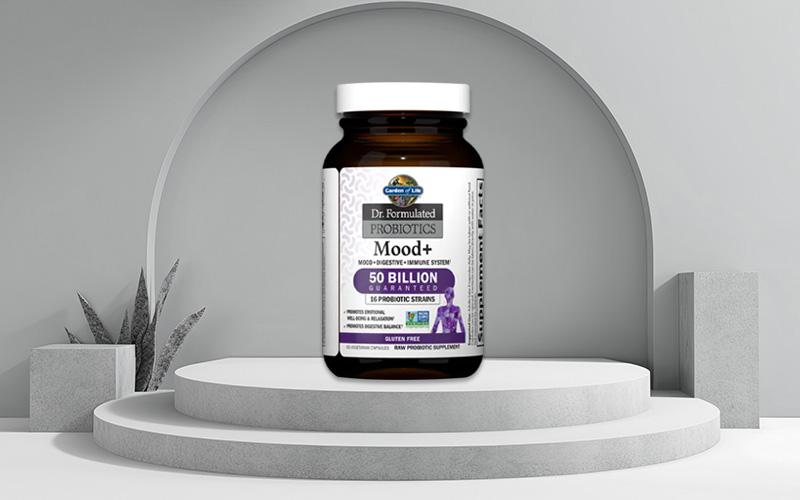

REVIEWOLOGY SCORE
Highlights
PROS
Aids in mood enhancement and relaxation.
Organic ingredients for natural stress relief.
Promotes digestive balance with diverse probiotic strains.
CONS
Contains prebiotic fiber, which might not be suitable for all dietary preferences.
Specific ingredients like ashwagandha may have interactions with certain medications.
Key Features
Garden of Life Dr. Formulated Probiotics Mood+ is a unique supplement that combines probiotics with organic stress-relief ingredients. For example, it contains clinically studied L. helveticus R0052 and B. longum R0175 strains, known for their positive impact on emotional well-being.
Additionally, these probiotics include organic Alaskan blueberries and ashwagandha for natural stress relief, along with acacia prebiotic fiber to nourish healthy gut flora. This supplement is designed for daily emotional and digestive support, making it a comprehensive choice for maintaining mood balance and gut health.
Nutrition Breakdown
The nutritional breakdown of Dr. Formulated Probiotics Mood+ Cooler 60 Capsules focuses primarily on the probiotic and herbal components rather than traditional nutritional elements like calories, fats, or sugars. This supplement includes 16 different probiotic strains amounting to 50 billion CFU, which are key for digestive health.
Organic ashwagandha and Alaskan blueberries, known for their stress relief and antioxidant properties, are also significant. Additionally, the presence of acacia prebiotic fiber aids in the nourishment of gut flora. This formulation is more about providing specific health benefits rather than conventional nutrition metrics.
Key Ingredients
The key ingredients in Dr. Formulated Probiotics Mood+ Cooler 60 Capsules are carefully selected for their benefits to mood and digestive health. The formula includes clinically studied probiotics L. helveticus R0052 and B. longum R0175, known for their positive impact on emotional well-being.
Organic ashwagandha and Alaskan blueberries are incorporated for their natural stress-relieving properties. Additionally, acacia prebiotic fiber is added to nourish the gut flora, enhancing the effectiveness of the probiotics. This unique blend makes this product an innovative choice for supporting mood and digestive health.
What We Like
- Effectively supports mood and emotional health.
- Organic ingredients for natural stress management.
- Comprehensive probiotic formula for digestive health.
What We Dislike
- May not be suitable for those sensitive to ashwagandha or specific probiotics.
- Possible interactions with certain medications.
Summary
Dr. Formulated Probiotics Mood+ offers a holistic approach to mood enhancement and gut health. While effective, users should consider ingredient sensitivities and potential medication interactions.
#4 Digestive Daily Probiotic Capsules
by Culturelle
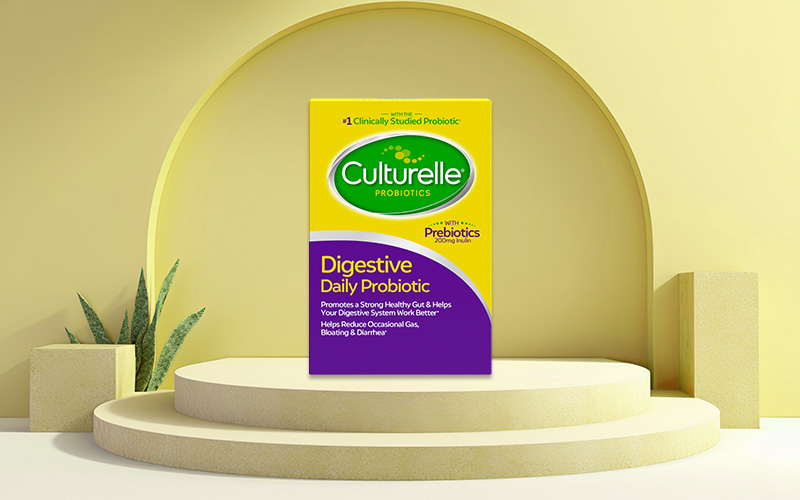

REVIEWOLOGY SCORE
Highlights
PROS
Clinically studied probiotic strain.
Convenient for everyday use.
Supports digestive and immune health.
CONS
Limited to one probiotic strain.
Not suitable for those with specific probiotic sensitivities.
Key Features
Culturelle Digestive Daily Probiotic Capsules are designed to enhance digestive health by primarily using the Lactobacillus rhamnosus GG strain. This probiotic strain is known for its ability to withstand stomach acid, ensuring effective colonization in the intestines. The product aims to balance the gut flora, which can ultimately support digestion and immune health.
Nutrition Breakdown
Each capsule delivers 12 billion CFUs of Lactobacillus rhamnosus GG. The focus is on probiotic content rather than traditional nutritional values like calories, fats, or sugars.
Key Ingredients
The main ingredient is Lactobacillus rhamnosus GG, a well researched probiotic strain. Other ingredients include microcrystalline cellulose and hydroxypropyl methylcellulose for the capsule composition.
What We Like
- It has Lactobacillus rhamnosus GG that can support digestive health.
- The product is designed to help restore the natural balance of good bacteria in the gut.
- It’s convenient for daily use and doesn’t require refrigeration.
What We Dislike
- The product focuses on a single strain of probiotics.
- It may not be suitable for many who are sensitive to probiotic strains.
Summary
Culturelle Digestive Daily Probiotic Capsules are formulated to support digestive health and minimize travel-associated digestive issues. They contain the clinically studied probiotic Lactobacillus rhamnosus GG, which helps restore the natural balance of good bacteria and supports digestion and immune defenses. The capsules are suitable for adults, are taken daily, and do not require refrigeration.
#5 Probiotic Pearls
by Nature’s Way
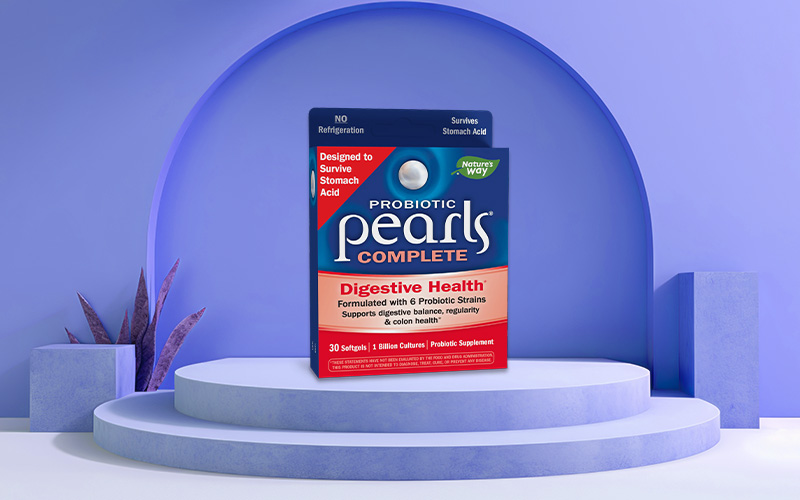

REVIEWOLOGY SCORE
Highlights
PROS
Promotes digestive balance and colon health.
Designed to survive stomach acid for effective delivery.
Small, convenient softgels, easy to take.
CONS
Contains fish gelatin and soy, a potential allergen for some individuals.
? Add more con ?
Key Features
Nature’s Way Probiotic Pearls Complete focus on promoting overall digestive and immune health. The product is formulated with a blend of six probiotic strains, including Lactobacilli and Bifidobacteria, which are known for their effectiveness on gut flora. These probiotics are encased in a unique triple layer softgel that ensures their survival through stomach acid, improving their delivery to the small intestine where they are most effective.
Nutrition Breakdown
This product primarily focuses on probiotic content rather than traditional nutrition metrics like calories, fats, or sugars. Each softgel provides one billion CFU from a proprietary blend of probiotics, including HOWARU® strains. These strains are specifically selected for their benefits to digestive health. The unique aspect of this supplement is its emphasis on probiotic viability and efficacy rather than conventional nutritional values.
Key Ingredients
Key ingredients include the proprietary probiotic blend. The strains used are specifically chosen for their ability to support gut health. The softgel itself is made with fish gelatin, palm oil, glycerin, and soy lecithin, components that contribute to the stability and delivery of the probiotics. This advanced formulation makes the Probiotic Pearls a distinctive choice for supporting digestive balance and immune health.
What We Like
- Effective for digestive balance.
- Unique technology for probiotic protection.
- No refrigeration is needed.
What We Dislike
- It is not suitable for vegans or those allergic to fish or soy.
Summary
Nature’s Way Probiotic Pearls Complete is a smart choice for those prioritizing digestive and immune health because of the product’s technology that ensures probiotic survival and efficacy. However, it’s important to consider dietary restrictions due to its ingredients.
#6 Probiotic-10
by NOW Supplements
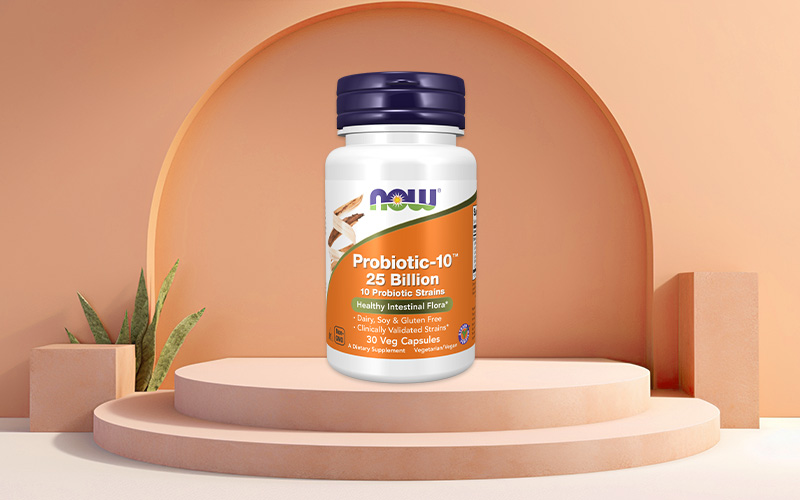

REVIEWOLOGY SCORE
Highlights
PROS
Supports healthy digestion and gut flora balance
Acid-resistant capsules ensure effective delivery of probiotics.
Suitable for vegans and vegetarians.
CONS
May not suit those who are sensitive to specific probiotic strains.
Refrigeration is recommended for maintaining potency.
Key Features
NOW Probiotic-10™ 25 Billion Veg Capsules contain a balanced blend of ten probiotic strains, providing a total of 25 billion colony forming units (CFU) per serving. These strains are selected for their ability to support gastrointestinal health, including Lactobacillus and Bifidobacterium species. The capsules are vegetarian and vegan friendly, and are designed to resist stomach acid and ensure effective delivery of probiotics to the intestine.
Nutrition Breakdown
The primary focus of these capsules is on probiotic content, with each serving offering a substantial dose of varied probiotic strains for gut health support without specific emphasis on calories, sugars, or traditional nutritional values.
Key Ingredients
The product includes Lactobacillus acidophilus, Lactobacillus plantarum, Lactobacillus bulgaricus, Lactobacillus paracasei, Bifidobacterium lactis, Bifidobacterium longum, and several other probiotic strains. These are combined in a cellulose capsule with FOS (Fructooligosaccharides) as a prebiotic to aid in the growth of probiotic bacteria.
What We Like
- Diverse probiotic strains for effective gut health support.
- Vegetarian/vegan-friendly formulation.
What We Dislike
- Refrigeration is needed for optimal potency preservation.
Summary
NOW Probiotic-10™ 25 Billion Veg Capsules offer robust support for digestive health with its diverse range of probiotic strains. Ideal for vegetarians and vegans, this product requires refrigeration to maintain efficacy. In addition, its wide range of ingredients may support relevant physical enhancements.
#7 Everyday Probiotics
by Bio-Kult
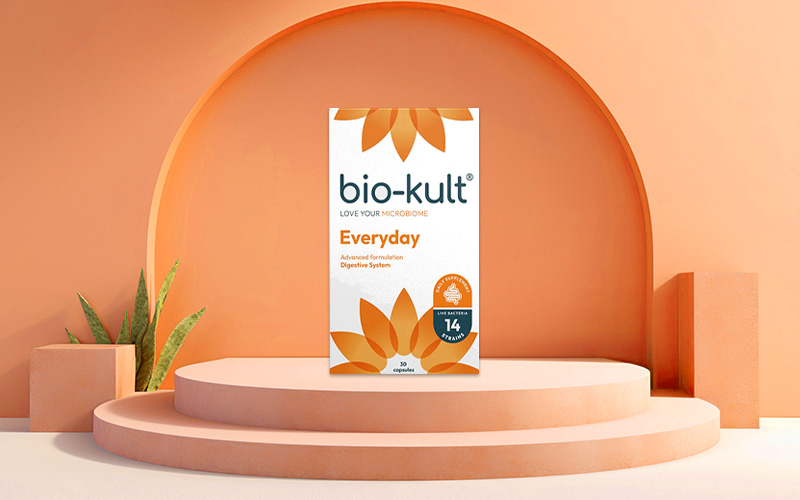

REVIEWOLOGY SCORE
Highlights
PROS
Enhances digestive health.
Variety of strains for comprehensive support.
No refrigeration is required.
CONS
Contains allergens like milk and soy.
May not suit everyone’s gut flora needs.
Key Features
Bio-Kult Everyday probiotics contains a unique blend of 14 live bacterial strains, including Lactobacillus and Bifidobacterium varieties, which are scientifically developed to support the digestive system. The formulation is gluten-free and approved by the Vegetarian Society.
Nutrition Breakdown
Each capsule of Bio-Kult Everyday contains two billion live bacterial microorganisms, focusing on probiotic support rather than traditional nutritional metrics like calories or fats.
Key Ingredients
The probiotic strains in Bio-Kult Everyday include Lactobacillus paracasei, Lactobacillus plantarum, Lactobacillus rhamnosus, and Bifidobacterium bifidum, among others. The capsules also contain bulking agents like microcrystalline cellulose and are encased in a hydroxypropyl methylcellulose vegetable capsule.
What We Like
- Supports a healthy digestive system.
- Suitable for a range of dietary requirements.
What We Dislike
- Potential allergens for those sensitive to milk or soy.
Summary
Bio-Kult Everyday probiotics offers a robust approach to digestive health with its diverse bacterial strains. It combines a wealth of effective ingredients to work against digestive issues. While effective for many, those with specific dietary sensitivities should take note of any potential problematic ingredients.
What’s the Difference Between Probiotics and Prebiotics?
While both probiotics and prebiotics contribute to gut health, they do so in different ways. Probiotics provide live beneficial microorganisms, whereas prebiotics offer nourishment to support the growth and activity of beneficial bacteria that are already present in the gut. Incorporating both into a diet can be beneficial for overall gut health and well-being.
| Aspects | Probiotics | Prebiotics |
| Nature | Live beneficial bacteria and yeasts | Non-digestible fibers and compounds. |
| Source | Found in foods, supplements, and fermented products. | Naturally occurring in certain foods. |
| Function | Introduces beneficial microorganisms into the gut. | Provides nourishment for existing beneficial bacteria. |
| Examples | Yogurt, kefir, sauerkraut, kimchi, probiotic supplements. | Garlic, onions, bananas, asparagus, and some dietary fiber supplements. |
| Health Benefits | Improved digestion, enhanced immune function, relief from digestive issues. | Promotion of a healthy gut environment, enhanced nutrient absorption, potential weight management support. |
| Interactions with Gut Microbiome | Introduces new bacteria into the gut. | Promotes the growth and activity of existing beneficial bacteria. |
How to Choose the Right Probiotic Supplement
Choosing the right probiotic supplement can be a crucial step in improving gut health. Here are some factors to consider when making a selection:
- Identify Any Specific Needs: Determine specific health goals and concerns. Are there digestive issues that need to be alleviated? Does the immune system need a boost? Is there a particular health condition that needs to be addressed? Understanding the body’s specific needs will help to narrow down the options.
- Consult a Healthcare Professional: If there are underlying health conditions or there’s confusion about which probiotic strain is most suitable, then it’s advisable to consult a healthcare provider. He or she can recommend a specific strain or combination of strains that best aligns with someone’s unique health objectives.
- Check the Strain and Species: Different probiotic strains offer distinct benefits. Look for supplements that specify the strain and species of probiotics they contain. For example, Lactobacillus and Bifidobacterium are common species, each with various strains known for different effects.
- CFUs (Colony-Forming Units): The CFU count indicates the number of live bacteria in each dose. A higher CFU count isn’t always better, as it depends on the specific strain and intended use. Discuss the appropriate CFU level with a healthcare provider.
- Look for Shelf-Stable Options: Some probiotics require refrigeration to maintain their viability. A supplement that doesn’t require refrigeration should be considered, especially if someone travels frequently.
- Check for Third-Party Testing: Look for products that undergo third-party testing for quality and purity. This ensures that the supplement contains the stated ingredients and isn’t made with any harmful contaminants.
- Research the Brand: Investigate the reputation of the brand. Established and reputable companies are more likely to produce high-quality probiotics. Read reviews and check for any certifications they may have.
- Avoid Excessive Fillers and Additives: Some supplements may contain unnecessary fillers and additives. Opt for products with minimal additional ingredients to ensure that the most concentrated probiotics are being used within the supplement.
- Consider Allergens and Dietary Restrictions: If someone has allergies or follows specific dietary restrictions (e.g., vegetarian or vegan), then the product’s label should be to ensure it meets their dietary requirements.
- Start Slowly: If someone is new to probiotics, then they should consider starting with a lower-strength supplement and gradually increasing the dosage. This can help the body adjust to the introduction of new bacteria.
- Monitor the Body’s Response: Pay attention to how the body responds to the probiotic supplement. It may take some time to notice changes in gut health. If any adverse effects are experienced, discontinue use and consult a healthcare professional.
- Stay Informed: Stay updated on the latest research and recommendations regarding probiotics and gut health. The field of probiotics is continually evolving, and new strains and formulations may become available
Probiotic Supplements for Specific Digestive Concerns
Probiotic supplements come in various formulations, each designed to target specific digestive concerns and provide tailored support for gut health. Here are some types of probiotic supplements that can address specific digestive issues:
- IBS-Targeted Probiotics: These probiotic supplements contain strains like Bifidobacterium infantis, Lactobacillus plantarum, and Lactobacillus rhamnosus GG (LGG), which are known to alleviate symptoms of Irritable Bowel Syndrome (IBS). They can help reduce abdominal pain, bloating, and irregular bowel movements.
- Diarrhea-Relief Probiotics: Formulated with strains such as Saccharomyces boulardii, Lactobacillus rhamnosus GG (LGG), and Lactobacillus acidophilus, these probiotics are effective in restoring gut balance, making them suitable for diarrhea-related issues, including antibiotic-associated diarrhea and traveler’s diarrhea.
- Constipation-Management Probiotics: Probiotic supplements containing Bifidobacterium lactis, Bifidobacterium animalis subsp. lactis, and Lactobacillus casei are tailored to promote regular bowel movements and alleviate constipation symptoms.
- IBD-Support Probiotics: For individuals with Inflammatory Bowel Disease (IBD), probiotics with multiple strains like VSL#3, Bifidobacterium breve, Bifidobacterium longum, and Lactobacillus plantarum can help modulate inflammation and support symptom management. Consult a healthcare provider for personalized recommendations.
- GERD-Friendly Probiotics: Probiotic supplements featuring strains like Lactobacillus acidophilus and Lactobacillus reuteri may contribute to maintaining a balanced gut environment and potentially alleviating certain symptoms of Gastroesophageal Reflux Disease (GERD).
- Gallstone and Digestive Health Probiotics: These probiotics, incorporating strains such as Lactobacillus gasseri and Lactobacillus reuteri, aim to improve overall digestive health and support gallstone prevention.
- Bloating and Gas Reducing Probiotics: Probiotic supplements containing Lactobacillus acidophilus and Bifidobacterium lactis work towards reducing bloating and gas by promoting better digestion and harmonizing gut flora.
- Food Allergy and Intolerance Management Probiotics: Probiotic strains like Lactobacillus rhamnosus GG (LGG), Bifidobacterium infantis, and Lactobacillus casei are often included in supplements designed to help manage food allergies and intolerances. They support the immune system and digestive function.
Who Should Take Probiotic Supplements
Probiotic supplements can be beneficial for a range of individuals and situations, but whether someone should take them depends on their specific health needs and circumstances. Here are some scenarios and groups of people who may consider taking probiotic supplements:
- Those Who Have Digestive Health Concerns: Individuals experiencing digestive issues such as bloating, gas, diarrhea, constipation, or irritable bowel syndrome (IBS) may find relief with probiotic supplements. Certain strains can help regulate digestion and alleviate these symptoms.
- People Who are Using Certain Antibiotics: Antibiotics can disrupt the balance of beneficial bacteria in the gut, leading to issues like antibiotic-associated diarrhea. Taking probiotics during or after a course of antibiotics may help restore this balance and reduce the risk of digestive upset.
- Those who Need Immune Support: Probiotic supplements may strengthen the immune system by promoting a healthy gut microbiome. This can be beneficial for individuals who are prone to frequent illnesses or those who are looking to bolster their immune function.
- People Who Needs Gut Health Support: Some people take probiotics regularly as part of their overall health maintenance routine to ensure a balanced gut microbiome. This approach is often considered for its potential long-term health benefits.
- Individuals with Food Allergies or Intolerances: Certain probiotic strains may assist individuals with food allergies or intolerances by modulating immune responses and improving digestive function.
- Those Who are Athletes: Athletes often use probiotics to support overall health and potentially enhance recovery, as strenuous exercise can affect gut function and immune health.
- Individuals with Chronic Health Conditions: People with specific chronic conditions, such as inflammatory bowel disease (IBD) or irritable bowel syndrome (IBS), may consider probiotics as part of their management plan. However, this should be discussed with a healthcare provider.
- Individuals with Age-Related Health Concerns: Probiotic supplements can be suitable for individuals of all ages, from infants to the elderly. Specialized probiotics are available for infants and children, adults, and seniors that address various health needs at different life stages.
Who Should Avoid Probiotic Supplements
While probiotic supplements can offer various health benefits, there are certain situations and individuals who should exercise caution or avoid them altogether. As with any new supplement that’s being introduced into the body, a healthcare provider should be consulted beforehand. Here are some cases where someone should consider avoiding probiotic supplements:
- Immunocompromised Individuals: If someone has a weakened immune system due to conditions like HIV/AIDS, cancer, or organ transplantation, probiotics may pose a risk of infection. Consult a healthcare provider before taking any probiotic supplements.
- Critically Ill Patients: Hospitalized patients in intensive care units (ICUs) or those with severe illnesses should generally avoid probiotics, as they may be at an increased risk of infections associated with probiotic use. Again, a healthcare provider should be consulted before taking any probiotic supplements.
- Post-Surgery: Individuals who have recently undergone surgery, particularly abdominal surgery, should refrain from probiotic supplements, as there is a risk of introducing bacteria into the surgical site.
- History of Allergies: If someone has a known allergy to components in probiotic supplements, such as dairy or soy, be cautious and select probiotics that do not contain these allergens. Always read product labels carefully.
- Severe Pancreatitis: In cases of severe acute pancreatitis, there may be a risk of infections related to probiotic use. Consult with a healthcare provider before taking probiotics if someone has this condition.
- Short Bowel Syndrome: People with short bowel syndrome or malabsorption disorders should be cautious with probiotics, as their ability to absorb nutrients and probiotics may be compromised. Consult a healthcare provider for guidance.
- Central Line or Catheter Use: Individuals with central lines or catheters should avoid probiotic supplements, as there is a risk of introducing bacteria into the bloodstream.
- Infants Under Two Months: Probiotic supplements are generally not recommended for infants under two months old, except under the guidance of a healthcare provider. Breast milk is typically sufficient for infants during this period.
- Individuals with Sepsis: People with sepsis, a severe infection that can lead to organ failure, should not take probiotics without the explicit recommendation and supervision of a healthcare provider.
Recommended Dosage for Probiotics
Probiotic dosage recommendations can differ significantly depending on a number of factors, including the strain(s) being utilized, the goal of supplementation, and the health needs of the individual. A daily dose of 1 billion to 10 billion CFUs (Colony-Forming Units), which are frequently found in over-the-counter supplements, is recommended for the general maintenance of gut health.
To restore intestinal equilibrium, higher doses, like 20–50 billion CFUs per day, can be recommended both during and after antibiotic treatment. If travelers want to avoid diarrhea, they should take doses in this range a few days prior to and during their trip.
There are pediatric and age-specific formulations available for children, infants, and seniors, but even higher doses (10–50 billion CFUs or more) may be necessary for those with chronic digestive problems, like IBS or IBD, in order to manage their symptoms. Women who are expecting or nursing should speak with their healthcare providers for specific advice.
When starting or stopping probiotic supplements, it’s important for people to speak with a healthcare provider to make sure their regimen is in line with their needs and health objectives. It’s wise to start with a smaller dose, then gradually increase it, while keeping an eye on the body’s response in order to gauge its tolerance and effectiveness.
Potential Side Effects and Safety of Probiotic Supplements
When used as prescribed, probiotic supplements are usually safe for a majority of people and have a number of possible health advantages. On the other hand, it’s critical to understand any possible adverse effects and safety issues.
When starting probiotics, some people may face potential side effects, including gas or bloating; however, these symptoms usually go away as the gut gets used to new bacteria. Minimizing these effects can be achieved by gradually raising the dose from the lower starting point.
There is a small risk of infection associated with probiotic supplementation. Thus, people with compromised immune systems, critically ill patients, and those with central lines or catheters should be cautious and speak with their doctors before using probiotics. Important factors to take into account include possible contamination, interactions with medications, and allergies to ingredients in probiotic supplements.
Choose reliable brands, follow dosage recommendations, and see a healthcare provider if necessary to ensure safety, particularly if medication is being taken, or if there are any underlying medical concerns. Probiotics generally show promise for improving health, but because individual reactions might differ, using them wisely and carefully is necessary to maximize their benefits.
When Should a Doctor be Consulted?
In a number of probiotic-related scenarios, consulting a healthcare provider is indicated. To ensure safety and appropriateness, it’s imperative to discuss probiotic use with a healthcare provider if medication is being taken, if there are any underlying medical conditions, or if a woman is pregnant or is breastfeeding a baby.
Probiotics should be taken cautiously by people with weakened immune systems, those suffering from severe illnesses, people with allergies, and parents considering giving their children probiotics. Additionally, after starting probiotics, it’s imperative to visit a doctor if someone is experiencing unexpected side effects, allergic reactions, severe or persistent gastrointestinal symptoms, or if they’re an older adult with age-related health difficulties.
Emerging Trends and Research in Probiotics
Probiotic advancements are rapidly advancing due to a surge in research that strives to achieve a deep understanding of gut microbiota and its critical role in general health. Recent research emphasizes how probiotics support a healthy gut microbiota [3], which is essential for immune system function, digestive health, and even psychological well-being.
This fast expanding field of study is focusing more on the cultures of specific probiotic strains, with the ultimate goal of creating products that contain particular health advantages. Among these goals are strengthening the integrity of the gut barrier, combating harmful microorganisms, and maximizing nutritional absorption. This kind of focused probiotic research points to a shift toward more effective and customized health care.
Still, it’s critical to recognize that probiotic supplements don’t follow a standard effectiveness model. The effects of probiotics fluctuate greatly from person to person depending on a variety of factors including genetic composition, food preferences, lifestyle, and medical conditions.
Because of this variance, more advanced solutions for gut health have been developed, surpassing the limitations of traditional probiotic supplements and fiber-based beverages. These cutting-edge techniques frequently combine probiotics with other gut-healthy ingredients, such as prebiotics and postbiotics, in a customized approach.
These customized approaches are designed to meet the unique requirements of every person while offering greater advantages over regular probiotics. Because of this, more people are choosing to use these advanced gut health remedies in an effort to effectively manage and relieve their digestive issues. In the field of managing gut health, this trend highlights a paradigm change toward more individualized and all-encompassing methods.
Frequently Asked Questions About Probiotic Supplements
Are all probiotic supplements the same?
No, not all probiotic supplements are the same. They vary in terms of the specific strains of bacteria they contain, their dosage, and the health benefits they target. Choosing the right probiotic supplement depends on individual health goals and needs.
Are probiotic supplements better than yogurt?
Yogurt and probiotic supplements have various functions. Probiotic supplements are appropriate for certain health objectives because they provide exact control over the bacterial strains and dosage. Probiotics are naturally present in yogurt, although their concentration varies, and they might not have the same specific advantages as supplements.
Are probiotics vitamins?
Probiotics are not vitamins. Probiotics are live, helpful bacteria that help maintain gut health; conversely, vitamins are organic substances needed for certain body processes. Vitamins and probiotics have different effects on general health and should not be mistaken.
Can fiber supplements and probiotics be taken together?
It is possible to take probiotics and fiber supplements at the same time. Probiotics and fiber together can improve digestive health because probiotics can flourish in a healthy gut environment that fiber maintains. It’s imperative to speak with a healthcare professional for tailored advice because everyone’s needs and goals are different.
Conclusion and Recommendations
Most people aren’t aware of the benefits of probiotics. These unique supplements help to maintain optimal gut health and so much more.
Sadly, many people forget to focus on their gut and intestinal health because of their busy schedules and lifestyles. A probiotic supplement can help to correct this issue.
High quality probiotics can easily be purchased from just about anywhere. Consumers simply need to just do some research into brands and products. To make their search easier, we’ve profiled quite a few popular probiotic supplement brands and thoroughly detailed the unique benefits they offer.
Everyone has their own individual health needs and issues. The good news is that there are probiotic supplements on the market that can support a host of health conditions. Lastly, it’s advised that consumers consult with a healthcare provider before beginning any probiotic regimen.
References:
- Wang, X., Zhang, P., & Zhang, X. (2021). Probiotics Regulate Gut Microbiota: An Effective Method to Improve Immunity. Molecules (Basel, Switzerland), 26(19), 6076. https://doi.org/10.3390/molecules26196076
- Liu, C., Radebe, S. M., Zhang, H., Jia, J., Xie, S., Shi, M., & Yu, Q. (2022). Effect of Bacillus coagulans on maintaining the integrity intestinal mucosal barrier in broilers. Veterinary microbiology, 266, 109357. https://doi.org/10.1016/j.vetmic.2022.109357
- Wieërs, G., Belkhir, L., Enaud, R., Leclercq, S., Philippart de Foy, J. M., Dequenne, I., de Timary, P., & Cani, P. D. (2020). How Probiotics Affect the Microbiota. Frontiers in cellular and infection microbiology, 9, 454. https://doi.org/10.3389/fcimb.2019.00454
RV Team
* Reviewology is in partnership or collaborates with top brands highlighted on this site, including those occupying the top ranking positions.
Additionally, we earn affiliate commissions from products showcased on this website when you make a purchase through the provided links on Amazon or the company website directly.
We appreciate your support using our links to purchase your favorite brands or newly discovered brands.
Latest updates
The Truth About 310 Greens: A No-Nonsense Review of This Popular Supplement
310 Shake vs Huel in 2024
Meal Replacement or Greens: Finding the Best Fit for Your Health
Popular
The Truth About 310 Greens: A No-Nonsense Review of This Popular Supplement
310 Shake vs Huel in 2024
Meal Replacement or Greens: Finding the Best Fit for Your Health
© 2024 Reviewology. All Rights Reserved.

